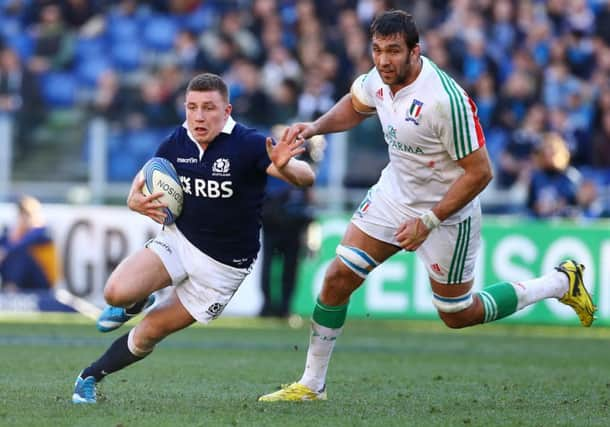Allan Massie: It’s amazing what a drop goal can do


Italy will doubtless look back on both matches as ones that got away. At the end of the first half, in which they had been the better team, few would have bet against them winning. Yet the Scottish forwards stuck at it, eventually getting on top. Alex Dunbar scored two splendid tries, and then came that drop goal.
Weir may play for Scotland for the rest of this decade and beyond it, but never kick a more important goal. It may not have turned our season round, but it has given the players and coaches breathing-space. If we had lost in Rome, suggestions that we should sideline Scott Johnson in favour of another interim coach to hold the fort till Vern Cotter arrives would have been aired loudly and in many places. So that drop goal which depended on the forwards doing their job, on Chris Cusiter delivering an exemplary pass, and on Weir holding his nerve and trusting his technique, has calmed things down and enabled us to look forward to France’s visit to Murrayfield with a measure of optimism rather than gloom and trepidation.
Advertisement
Hide AdAdvertisement
Hide AdEven setting that aside it was necessary in the context of the match, both for Weir as an individual, and for the whole team. Weir made a number of errors, nevertheless had his best game yet for Scotland. Even so, but for that goal, his performance would probably be remembered for his dreadful mistake in the first half when, running free on a two-to-one with Sean Lamont outside him and (doubtless) screaming for the ball, he turned in, slipped, and the opportunity of a try was gone. As for the team we once again failed to deal effectively with the Italian restart after Dunbar’s second try had put us 18-13 ahead. That failure led to Furno’s try, and came close to costing us the match. Losing 18-20 having got back from 3-13 would have felt every bit as bad as the drop goal has left us feeling good.
Since many, myself among them, have been critical of Scott Johnson’s selections, it’s fair to say that this time he got it right, or pretty near right. The returning exile Richie Gray was immense. Johnnie Beattie had a fine game and Scott Lawson a terrific one. (Incidentally how good it was to see Ross Ford, who had been dropped in favour of Lawson and not used as a replacement, beaming with happiness as he paraded round the ground with the rest of the squad after the final whistle.)
For once, too, the replacements seemed mostly well-judged. Moray Low was substituted just before half-time, having fallen as foul of referee Steve Walsh as England’s Dan Cole did in Cardiff last year – looking, one may add, every bit as bemused by the referee’s decisions as was Cole then. Geoff Cross did very well in the second half, a notable effort from a player who has had shamefully little rugby this season because Edinburgh’s coach, Alan Solomons, has consistently preferred the South African W P Nel to the Scotland prop. Chris Cusiter, coming on fresh for the last 15 minutes, injected pace and urgency into the Scottish performance. He contributed notably to our second try, though the pass he gave to set Dunbar free was flat if you were a Scot, forward if you were Italian. David Denton did enough to emphasise that we really want to have him and Beattie on the field at the same time. That said, it was the man he replaced, Chris Fusaro, who had set us on the road to recovery by winning the second-half penalty that Greig Laidlaw kicked to make the score 6-13.
Nobody should underestimate the importance of this win, and nobody should say it was “only Italy”. They are a tough team to beat these days, as Wales found in Cardiff, and especially tough to beat in Rome. After all, until Saturday, we hadn’t won there since Frank Hadden was Scotland coach. So we may fairly conclude that there were more good things than bad – even though we might be in a different frame of mind if Weir had fluffed that kick.
The line-out was secure and effective for the first time this season, and Jim Hamilton even pinched the first two Italian throws. The set scrum was good in the second half. We can surely all agree with Johnson that in Matt Scott and Dunbar we have the making of a centre partnership of genuine international class. Keep them together, give them time, and we may soon be comparing them to John Leslie and Alan Tait in 1999, Sean Lineen and Scott Hastings in the early Nineties.
Weir has done enough to be trusted with the No 10 jersey for the last two matches of the championship at least.
So things look brighter than they did a week ago. Victory over France now looks possible, though it is unlikely that France can be as bad as they were in Cardiff on Friday night when the French forwards were thoroughly mastered by Wales. The French are evidently missing Thierry Dusautoir, and as long as Philippe Saint-Andre continues to pick Jean-Marc Doussain at scrum-half rather than Morgan Parra, France start with a handicap.
They say the night is darkest just before dawn. Well, nothing could have been darker than the mood after the Calcutta Cup. So perhaps we can hope to discern the first light of a new and happier day. Perhaps.